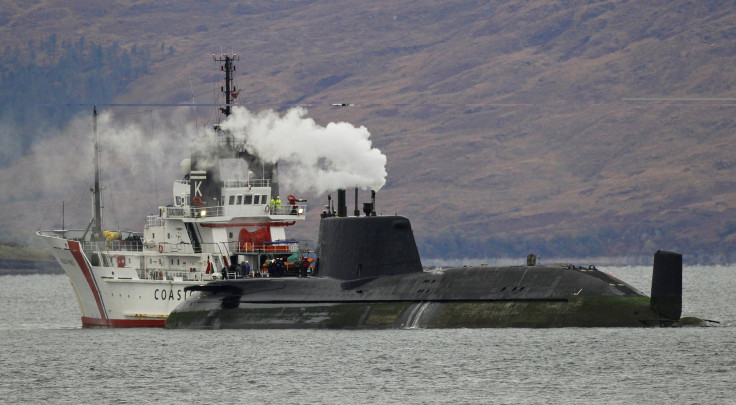UK Left With Few Options Vs Iran After Tanker Arrest In Strait Of Hormuz

(Updated to include Iranian foreign minister's comments)
- Iran Foreign Minister Javad Zarif calls detention of its tanker "piracy."
- Commons Foreign Affairs Committee chairman says military option "extremely unwise."
- Britain lacks the military muscle to take on a well-prepared Iran
The U.K. is looking for diplomatic ways to resolve the tensions with Iran after a British-flagged oil tanker was seized by the Iranian Revolutionary Guard Corps (IRGC) on Friday, despite Foreign Secretary Jeremy Hunt warning Tehran of "serious consequences" Friday.
Iran has explained that the Stena Impero was seized for an investigation after it collided with an Iranian fishing boat, and not as a tit-for-tat action to the U.K. helping detain an Iranian tanker in the Gibraltar. And Tom Tugendhat, the chairman of Britain’s House of Commons Foreign Affairs Committee, said it would be “extremely unwise” to resort to military action to free the tanker. The statements, taken together, signal a desire to de-escalate from both parties.
That is understandable as the U.K., despite its pretensions to being a world power, does not have the military muscle or power-projection capability to take on Iran, which has invested heavily in military assets in the last few years and has proxy players across the Mideast who can hurt western interests in case of war. The Royal Navy has just two warships in the Gulf, with a third on the way, but that is not enough to deter Iranian forces in their own backyard.
Britian summoned Iran's charge d'affairs and Hunt vowed a "considered but robust" response. Still Iran doesn't seem too worried what those responses would be. Iran's Foreign Minister Javad Zarif, in a tweet, called the Gibraltar action that sparked the current standoff a "piracy" while saying Iran's actions were to uphold international maritime rules.
Unlike the piracy in the Strait of Gibraltar, our action in the Persian Gulf is to uphold int'l maritime rules.
— Javad Zarif (@JZarif) July 20, 2019
As I said in NY, it is IRAN that guarantees the security of the Persian Gulf & the Strait of Hormuz.
UK must cease being an accessory to #EconomicTerrorism of the US.
Already questions are being asked on whether London miscalculated in detaining the Iranian tanker and again over-estimated its military capabilities to protect its shipping in the Gulf.
The U.S. has sent additional troops to the Gulf region, a deployment not directly connected to the latest incident, and President Donald Trump has no appetitite to commit militarily against Iran unless U.S. interests are directly threatened, commentators have said.
The Sun said the United States’ Patriot air defence missile systems with soldiers have arrived at the Prince Sultan Air base, south of Riyadh. The Central Command said the movement of forces provides an additional deterrent, and ensures their ability to defend their forces and interests in the region from emergent, credible threats.
But the development helps underlining Trump's narrative on Iran. Trump said Iran is in big trouble and is probably glad too that now the European leaders, who had earlier opposed his Iran policy and decision to withdraw from the 2015 nuclear deal, will be forced to tow his line.
Tensions between Washington and Tehran peaked after the U.S. designated IRGC as a foreign terrorist organization and imposed hard sanctions on the country. This was followed by cyber attacks on Iran, and the shooting down of a U.S. drone by Iran as well as attacks on oil tankers in the Gulf that the U.S. has blamed on Iran.
Iran detention of the Stena Impero comes as a validation of Trump’s stance on Iran. “This only goes to show what I’m saying about Iran. Trouble. Nothing but trouble. It goes to show you I was right about Iran,” the President said. Trump confirmed that the U.S. and U.K. will work together to find a solution to the worsening tanker row. “Well, as you know we have a very close alliance with the U.K. and we always have. We don’t have very many tankers going in but we have a lot of warships there and we’ll talk to the U.K.,” he said.
European leaders, notably those form the U.K., France and Germany, had been resisting Trump’s policy on Iran and been trying their best to save the Iran nuclear deal. But they were forced into tight corner when Iran recently announced that it had brokent he uranium enrichment limits set in the 2015 agreement negotiated by the U.S., U.K., France, China, Russia and Germany.
According to Fox News, Iran said the violations are designed to force European states to stop complying with crippling U.S. economic sanctions on the Islamic Republic or get them to compensate Iran for the sanctions.
The Trump administration has ignored Europe’s warning about escalating tensions with Iran. Tugendhat told The Atlantic that U.S. position on Iran has shown that the EU’s security policy is controlled by the importance of the U.S. dollar to global trade. “U.S. sanctions determine our policy, and unless there is a new global currency and banking system, it will remain so,” he said.
© Copyright IBTimes 2025. All rights reserved.





















